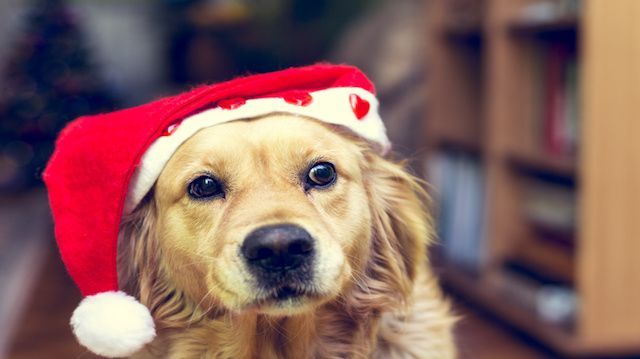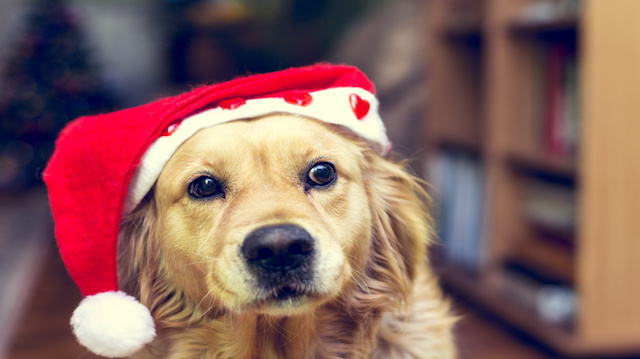
If you share your home with dogs or cats, it’s important to ensure that none of those pretty plants can make your pet sick. Some popular holiday plants can cause temporary gastrointestinal upset, while others have the potential to kill a pet.
Amaryllis
If waiting for the beautiful amaryllis to bloom is part of your holiday tradition, find another way to celebrate if you have pets. The amaryllis is a member of the lily family, and while it is not as toxic to animals as many lilies, it can cause severe health issues if your dog or cat consumes the leaves or other parts of the plant. The most poisonous part of the amaryllis is the bulb, which an unsupervised dog might chew on even if the stalk hasn’t erupted from the soil. Amaryllis contains lycorine, an alkaloid that triggers vomiting. Signs of flower or stalk ingestion include the following:
- vomiting
- diarrhea
- appetite loss
- hypersalivation
- seizures
- abdominal pain
If you know or suspect your pet has consumed any part of an amaryllis, take him or her to the veterinarian immediately. Amaryllis is also known by other names, so steer clear of plants sold under the following names:
- belladonna
- Cape belladonna
- naked lady
- St. Joseph lily
Christmas cactus
Unless your pet is truly a glutton for punishment, there’s no problem decorating with Christmas cactus. The plant isn’t poisonous, but the spikes are sharp. If a dog or cat is foolhardy enough to eat a cactus, he will end up with gastrointestinal ailments. Make the decision whether or not to display Christmas cactus based on your perception of your pet’s intelligence.
Holly
Holly isn’t jolly if your dog or cat eats the berries or leaves. Holly, whether English, Japanese or Chinese, contains saponins, which can cause drooling, vomiting and diarrhea. Neurological problems, such as head shaking, can also occur. If your pet eats the sharp leaves, all sorts of unpleasant gastrointestinal problems may ensue. Decorate with holly outside if your pet can’t reach it, but keep it out of the house.
Poinsettia
You may have heard that this common Christmas plant is poisonous to pets, and you may have avoided it on that basis. Actually, your pet would need to consume quite a bit of the plant to suffer deleterious effects, and he’s unlikely to eat that much of it because the sap quickly causes mouth irritation. This results in excessive salivation. While you should keep poinsettias out of the reach of pets, there’s no reason to ban this holiday favorite from the premises entirely. The ASPCA’s animal poison control website refers to the poinsettia as “generally overrated in toxicity.”
Under the mistletoe
 On the plus side, mistletoe is usually placed near the ceiling, out of reach of dogs and all but the most enterprising cats. On the negative side, mistletoe is toxic when consumed, and there’s always the possibility that a mistletoe sprig could fall to the floor. Dried mistletoe is as dangerous as the fresh variety. Symptoms of mistletoe consumption include the following:
On the plus side, mistletoe is usually placed near the ceiling, out of reach of dogs and all but the most enterprising cats. On the negative side, mistletoe is toxic when consumed, and there’s always the possibility that a mistletoe sprig could fall to the floor. Dried mistletoe is as dangerous as the fresh variety. Symptoms of mistletoe consumption include the following:
- slow heart rate
- low blood pressure
- gastrointestinal upset
- breathing issues
- erratic behavior
Fido or Fluffy will require a trip to the vet if they eat mistletoe. If a pet eats enough of it, he could die from heart failure. Stay on the safe side by passing on the plant, or simply put it up for a party from which the pets are excluded, removing it before allowing animals access to the room.
Everyone should have a happy holiday, whether they have two legs or four. A little pre-holiday planning makes all the difference in safeguarding your fur friends against poisonous plants — and more. Remember that small children may also nibble on potentially toxic holiday plants, so you are protecting toddlers who might find errant leaves or berries irresistible, too.
—The Alternative Daily
Sources:
http://www.petmd.com/dog/seasonal/evr_multi_dangerous_winter_holiday_plants
http://moderndogmagazine.com/articles/which-holiday-plants-are-toxic-dogs/34008
http://www.fda.gov/AnimalVeterinary/ResourcesforYou/AnimalHealthLiteracy/ucm195391.htm
https://www.aspca.org/pet-care/animal-poison-control/toxic-and-non-toxic-plants
http://www.petpoisonhelpline.com/poison/holly

